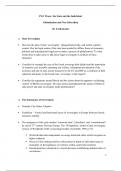PL2: Power, the State and the Individual
Globalisation and Neo-Liberalism
Dr Tarik Kochi
1. State Sovereignty
How has the idea of state ‘sovereignty’ changed historically, and within a global
context. Has the legal notion of the state been eroded by diffuse forms of economic,
political and (international) legal power under a process of globalisation? To what
extent does it make sense to talk about legal sovereignty in isolation of these
elements?
Consider for example the case of the Greek sovereign debt default and the imposition
of austerity (cuts in public spending and welfare, widespread privatisation of the
economy and sale of state assets) measures by the EU and IMF as a condition of debt
reduction and loans. Is the Greek state ‘sovereign’ in this regard?
Consider the arguments around Brexit and the claims about the apparent ‘reclaiming
control’ of British sovereignty. Do such claims misunderstand the nature of limits of
state power and state sovereignty under globalisation?
2. The Emergence of Sovereignty
Nomads, City-States, Empires
Feudalism – Vertical and horizontal layers of sovereignty in Europe between church,
monarch, nobility
The emergence of the early modern ‘territorial state’ (‘absolutist’ and ‘constitutional’)
by end of 17th century Western Europe. The ‘Westphalian’ model of state sovereignty
(‘peace of Westphalia 1648’) consisting broadly of (in Held, 1999, p.37):
World divided into independent sovereign territorial states which recognise no
higher authority
Process of law-making and law enforcement in hands of individual states (a
monopoly on the legitimacy of violence within a particular territory)
International law orientated to a moral discourse establishing minimal rules of
coexistence
1
, Formal equality of states in their relationship between each other
Differences between states often settled by force
Global sovereignty emerges in the context of colonisation and empire.
European colonialism recognises some peoples as independent therefore
sovereign (based on military capacity and assumed level of ‘civilisation’),
while others are conquered and placed under subjection.
A world order shaped by the military and economic power (hegemony) and
culture of various European overseas empires (Spanish, Dutch and English)
often justified under claims to be carrying out a higher law or noble purpose –
i.e. furthering ‘Christianity’, or ‘civilisation’.
So some states recognised as sovereign and equal and others lacking
recognised sovereignty, or, bearing at best a form of quasi-sovereignty within
an empire – an inequality of sovereignty.
Capital, (from the exploitation of raw materials and cheap labour; and through
unequal terms of exchange in trade), flows to the metropole at the expense of
the periphery in the colonies. The enrichment of core states at the expense of
colonised.
The transference/imposition of customs, morals, laws and social values from
the core to the periphery, the reorganisation of traditional modes of social life
upon European models and determined by European expertise.
Hypocrisy of western European states who claim to uphold values of ‘reason’,
‘liberty’, ‘human rights’, ‘representative government’, ‘democracy’, ‘rule of
law’, while keeping colonial peoples under conditions of domination and
subjection.
The emergence of the modern state system between 1914 and 1945 through a process
of decolonisation. The recognition of newly independent states as sovereign under a
system of international law and the newly established United Nations (1945). The
‘formal equality’ of all states.
Independence of many new post-colonial states often achieved via violent and
non-violent struggle of colonial peoples against the colonisers – independence
and self-determination won via political struggle, wars of national liberation
and revolution.
The colonised peoples of the Third World using the ‘European’ language of
liberty, democracy and universal human rights against their European
colonisers. Perhaps adopting this language as their own through struggle –
making it truly universal?
2





